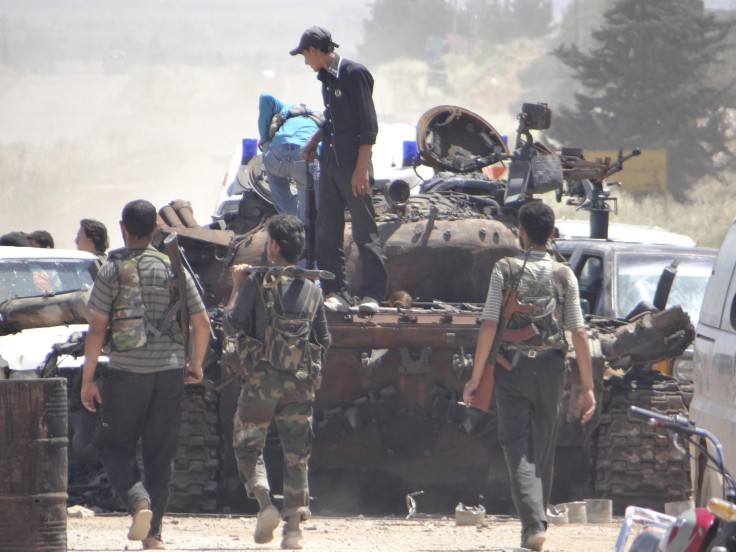McCain Visits Syrian Rebels; Europeans Can't Decide On Aid

[Update 6:55 p.m. EDT] The European Union has lifted the arms embargo on the Syrian rebels, British Foreign Secretary William Hague said from Brussels Monday evening.
Hague tweeted: "Right EU decision tonight. Arms embargo on Syrian opposition ended. No immediate decision to send arms. Other sanctions remain."
EU foreign policy chief Catherine Ashton, however, told reporters at a news conference that "member states will not proceed at this stage with the delivery" of equipment that has until now been subject to the ban, the BBC reported.
Sen. John McCain, R-Ariz., visited rebels in Syria Monday, his communications director confirmed to CNN, making him the highest-ranking American elected official to visit the war-torn country.
Brian Rogers confirmed a report that originally appeared on The Daily Beast, which indicated McCain, a vocal advocate of arming the rebels, entered Syria through Turkey, and remained in the country for several hours.
Meanwhile, European Union governments have failed to agree on easing an arms embargo on Syria to help the rebels, Austrian Foreign Minister Michael Spindelegger said Monday, according to Reuters.
EU foreign ministers met in Brussels to bridge their differences over the issue, with Britain and France pushing to let European governments deliver arms. Austria and several other EU nations oppose such moves.
"I regret that after long talks it was not possible to find a compromise with the UK and France," Spindelegger told reporters.
Heavy fighting raged around the strategic Syrian border town of Qusair and Damascus Monday, Reuters reported.
The Syrian military pounded eastern suburbs of Damascus with airstrikes and artillery and loud explosions echoed around al-Nabak, 80 km (50 miles) north of the capital, where fighting has cut the highway running north to the central city of Homs, the pro-opposition Syrian Observatory for Human Rights group said.
Recent government offensives are seen as a move to strengthen President Bashar al-Assad's position before an international peace conference sponsored by the United States and Russia and proposed for next month.
Opposition activists said Syrian troops backed by Lebanese Hezbollah fighters were pressing a sustained assault on Qusair, a town long used by insurgents as a way station for arms and other supplies from Lebanon.
While in Syria, McCain met with Gen. Salem Idris, the leader of the Supreme Military Council of the Free Syrian Army, said Mouaz Moustafa of the Washington-based Syrian Emergency Task Force, which helped plan the trip. The senator spent about an hour meeting with FSA commanders from various parts of the country including Aleppo, Homs and Idlib.
McCain, the leading voice in Congress for U.S. intervention, has suggested establishing "safe zones" for the rebels and taking out the regime's air assets, along with providing lethal weapons to Syria's opposition. In their meeting with McCain, rebel leaders prodded the United States to send them weapons for fighting Assad. They also called for establishing no-fly zones and for airstrikes against Assad's regime, according to the Daily Beast's report.
Moustafa of the Syrian Emergency Task Force called McCain's visit "an incredibly important trip and trips like this need to happen more frequently. It was very important because one of the biggest arguments against supporting the opposition is not knowing who they are. So being able to sit face-to face with these commanders brings a much higher level of confidence in who they are."
In Harasta, an eastern Damascus suburb largely under rebel control, dozens of people were afflicted by respiratory difficulties after an apparent overnight chemical attack, opposition sources told Reuters. Video showed victims lying on the floor of a room, breathing from oxygen masks.
Both sides have accused each other of using chemical weapons. France's Le Monde newspaper published first-hand accounts on Monday of apparent chemical attacks by Assad's forces in April.
The newspaper said one of its photographers had suffered blurred vision and breathing problems for four days after an attack on April 13 on the Jobar front, in central Damascus.
Another video from Harasta overnight showed at least two fighters being put into a van, their eyes watering and struggling to breathe while medics put tubes into their throats.
It was not possible to verify the videos independently.
© Copyright IBTimes 2024. All rights reserved.





















